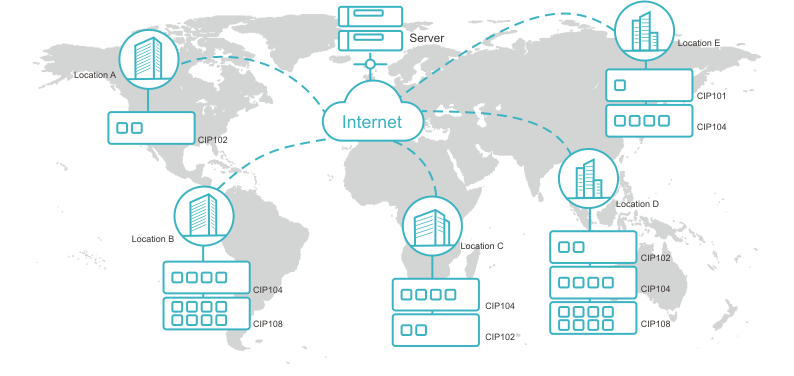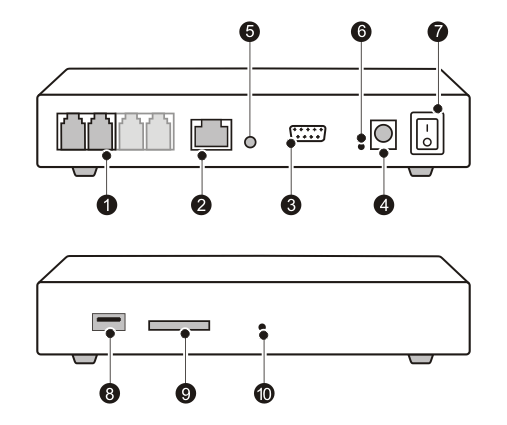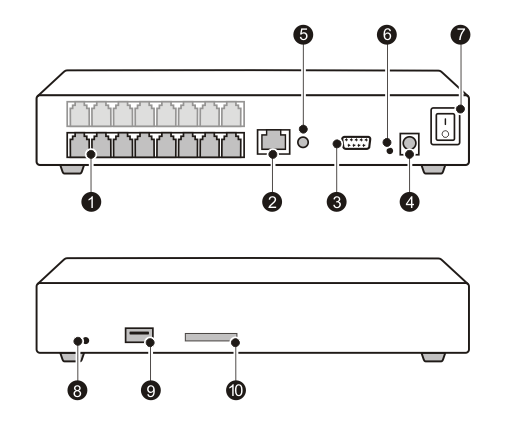CIP Series Phone Number Verification Solution
CIP phone number verifier is a standalone device with embedded system to send inbound Caller ID to server IP. Via RS232 connection, it can to send Caller ID information to PC as well. The call is not answered, so there is not any cost generated in either way. System server will compare the Caller ID with member registered phone number and complete the verification process. Interactively, web server can make a call remotely through the Websocket transmission.
CIP101 Single Line Verifier CIP102 2 Line Verifier
CIP104 4 Line Verifier CIP108 8 Line Verifier
Data Transfer to web server IP:
Remote: Server receives the inbound call data via http(s) POST
Local: PC receives the inbound call data via RS232 connection
Data content:
1. Inbound Caller ID
2. Outbound Caller ID
3. Line status including idle, hook-on, hook-off, ringing and disconnected
4. Event time
5. Ringing time detection
6. Device ID
7. Line ID
Issue command to verifier device:
Remote: Server issues command to verifier device via WebSocket
Local: PC issues command to verifier device via RS232 connection
Command contents:
1. Hook-off
2. Dialing
3. Hook-on
Features
∎ Stand-alone, No PC required
Embeded system device works with landline and LAN only, no PC required
∎ Free of charge for both user and platform verification
Without answering the phone call, device will collect the inbound Caller ID. Neither the user nor the platform needs to pay for the call
∎ Flexible Capacity
Expandable and stackble for various requiremnt of web plateform construction model for system requirements
∎ Data Transmission
Support encrypted data transmission via http(s) POST
∎ WebSocket Domination
Through WebSocket transmission, webpage achieves to make call on landline
∎ RS232 Connection
PC can obtain the data and make calls via RS232 connection
∎ Sufficient Develop Material
Not only Caller ID but also landline status will be sent to server IP for further web applications
∎ Application development
Easy documentation for engineer effective development
∎ 24x7 Phone number verification
Instant forwarding inbound caller ID to web server for online verification
∎ Mobile number/Landline number verification
User dials system phone number to verify the mobile number through device Caller ID forwarding
∎ Simple installation
All you need is device connected with landline and network
Multi-Sites Construction
Configure the same forwarding IP in multi-sites verifiers, allocated different system telephone number to devices. Verification process will be effective, alternative and safe.
All verifier CIP101 / CIP102/ CIP104 / CIP108 can be mixed or expanded.

Appearance
CIP101/CIP102

1. Line/Phone
2. Ethernet port
3. DC12V
4. RS232 indicator
5. Power ON/OFF
6. Reserved
7. RS232 indicator
8. USB port for update
9. SD card slot for storage and update
10.Power indicator
CIP104/CIP108

1. Line/Phone
2. Ethernet port
3. DC12V
4. RS232 indicator
5. Power ON/OFF
6. Reserved
7. RS232 indicator
8. Power indicator
9. USB port for update
10.SD card slot for storage and update
Size and Weight
CIP101/CIP102
Set Size: 180x143x32 mm (WxHxD)
Package Size: 260x230x76 mm (WxHxD)
Set Weight: 0.68kg
Package Weight: 1.2Kg
CIP104/CIP108
Set Size: 252x176x42 mm (WxHxD)
Package Size: 310x230x127 mm (WxHxD)
Set Weight: 1.7kg
Package Weight: 2.5Kg
Caller ID
Capacity :
CIP101 1 Line /CIP102 2 Line /CIP104 4 Line /CIP108 8 Line
CID format: DTMF/FSK
CID intensity: 0dB to-32dB
Input impedance: AC : 100KΩ,DC : 5.1MΩ
S/N ratio: >60dB
Signal-to-crosstalk ratio: >70dB
Power Consumption
CIP101/CIP102
Rating operating current: 0.5A
Max. working current: 1.2A
Rating power: 6W
CIP104/CIP108
Rating operating current: 1A
Max. working current: 1.5A
Rating power: 20W
Interface
CIP101/CIP102
Power: Input AC100-240V Output DC12V 1A
CIP104/CIP108
Power: Input AC100-240V Output DC12V 2A
RJ11 in: Telecom Landline
RJ11 out: Phone set
RJ45: Ethernet LAN
Environmental Requirements
Operating temperature: 0℃~40℃ (32℉~104℉)
Storage temperature: -40℃~70℃ (-40℉~158℉)
Relative humidity: 10%~90% noncondensing
Storage humidity: 5%~90% noncondensing